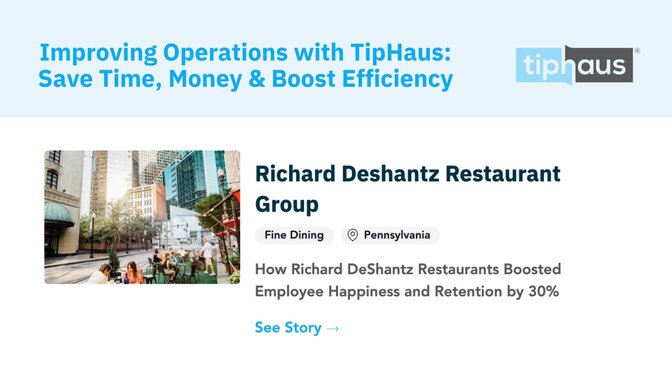
Please note: We are not a legal firm and do not provide legal advice. This article is for informational purposes only. Consult with a qualified attorney before implementing any practices discussed herein.
Tipping is central to Pennsylvania’s restaurant and hospitality industry, but it comes with strict rules on minimum wage, tip credits, tip pooling, and service charges. Employers who fail to comply risk fines, disputes, and reputational harm, while tipped employees benefit from legal protections.
This guide breaks down the key Pennsylvania tipping laws for 2025 and shows how TipHaus helps operators stay compliant.
Under federal law, all employees are entitled to earn at least the minimum wage of $7.25 per hour. Pennsylvania follows this federal standard, meaning tipped employees must still make at least this amount when combining their base wages and tips.
Pennsylvania allows employers to take a tip credit, meaning they can pay tipped employees a lower base wage as long as their tips make up the difference to meet the minimum wage. Employers can take a tip credit of up to $4.42 per hour, which means tipped employees must be paid at least $2.83 per hour in base wages. If an employee’s tips do not bring their earnings up to $7.25 per hour, the employer must cover the shortfall.
Tipping laws in Pennsylvania include the 80/20 rule, which states that tipped employees must spend at least 80% of their work time on tip-generating activities. If they spend more than 20% of their time on non-tipped tasks, they must be paid the full minimum wage for that time.
Additionally, an employee must earn at least $135 in tips per month to be classified as a tipped employee and qualify for a tip credit.

Pennsylvania permits tip pooling, where employees contribute a portion of their tips to be redistributed among other tipped employees. However, there are strict rules about who can be included in a tip pool:
Employers must notify employees if they will be participating in a tip pool, and employees cannot be required to contribute more than what is considered customary and reasonable.
Related reading: Tip Pooling vs. Tip Sharing: Which is Right for Your Restaurant?
Some restaurants and event venues add a mandatory service charge to customers’ bills for large parties, private events, or catered services. It’s important to note that:
This means that even if a customer assumes a service charge is going to their server, there is no legal requirement for that money to be passed on to employees.
Unlike some states, Pennsylvania law prohibits employers from deducting credit card processing fees from employees’ tips. This means that if a customer tips using a credit card, the employee is entitled to receive the full tip amount, regardless of any fees the business incurs from credit card companies.
Richard DeShantz Restaurant Group is a staple of Pittsburgh’s culinary scene. To stay compliant with wage laws and improve team morale, they turned to TipHaus. The result? A transparent tip distribution system, happier staff, and a 30% increase in employee retention.
👉 Read the full case study here.

Tipped employees in Pennsylvania have legal protections under both state and federal laws. Employers must:
Employees who believe their tipping rights have been violated can file a complaint with the Pennsylvania Department of Labor and Industry or the U.S. Department of Labor.
With the TipHaus Employee app, team members can see a clear, real-time breakdown of their tip earnings. This transparency helps employees understand exactly how their tips are calculated, boosting trust and engagement.
There's more information on tipping laws at the U.S. Department of Labor (DoL) site.
Navigating Pennsylvania’s tipping laws can be challenging. TipHaus automates compliance so operators can focus on running their business.
✅ Automated tip calculations & payouts
✅ 80/20 rule tracking for dual work compliance
✅ Transparent pooling records for audits
✅ No manual spreadsheets or payroll errors
✅ Real-time employee visibility into tips
Stay compliant, save time, and build employee trust. You can start your free trial today or see how much you can save with our ROI calculator.